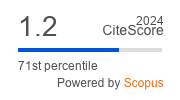Author Guidelines
Kindly be informed that due to the invasion of Ukraine by the Russian Federation the editors of our Journal have decided not to consider manuscripts submitted by scholars and scientists who work at Russian education and research institutions. The invasion violates international law, jeopardises world peace and human rights of the citizens of Ukraine. All scholars from the Russian Federation are no longer members of the Editorial and Advisory boards unless they personally and openly condemned the aggression of their country against Ukraine.
The Editorial board kindly invites authors to publish a scholarly paper or a review article in the journal. Please submit your manuscripts online.
Your published articles will be in open access on the journal site: https://eejpl.vnu.edu.ua and be deposited both in the DOAJ archive and in the VNU Publishers repository: http://evnuir.vnu.edu.ua/handle/123456789/4099.
Ensure that any manuscript you submit conforms to the Committee on Publication Ethics (COPE) and the recommendations for ethics, as well as to EEJPL's general article requirements.
All submitted scholarly paper(s) will be peer-reviewed and the editorial board will inform the author(s) about any decision (on peer-review policy see here: https://eejpl.vnu.edu.ua/index.php/eejpl/policy).
Systematic reviews or meta-analysis: East European Journal of Psycholinguistics requires a completed PRISMA checklist and flow diagram as a condition of submission when reporting findings from a systematic review or meta-analysis. Templates for these can be found on the PRISMA website which also describes several PRISMA checklist extensions for different designs and types of data beyond conventional systematic reviews evaluating randomized trials. At minimum, your article should report the content addressed by each item of the checklist. Meeting these basic reporting requirements will greatly improve the value of your review and may enhance its chances for eventual publication.
All submissions should include two separate files:
a) A title page file with authors' names, email addresses, ORCID IDs, and affiliations.
b) A manuscript file without mentioning the authors' names and their affiliations, email addresses, or ORCID IDs in the text and References, e.g. (Authors, 2023).
Authors should avoid using the first person (e.g., I, my, we, our) when referring to a study they conducted or when such usage would reveal their identities. For example, avoid phrasing such as “In our previous work, White et al. (2025) reported that...”. Instead, refer to such work in the third person: “White et al. (2025) reported that...”.
Additionally, authors’ institutional affiliations must be masked in the manuscript.
The originals must meet the following requirements:
LANGUAGES
English (preference), Ukrainian.
FORMAT /LENGTH
The article must be in a version similar or higher than Word 97. The recommended length is 10-18 pages (max 5,000 words) including two abstracts and references, A4 paper format, with 2,5 cm for upper, lower, right and left margins, observing 2 space between lines and with Times New Roman font type, with a 12 point body.
TITLE- AUTHOR’S IDENTIFICATION
The first page must include the capitalized and centered title of the article in bold. Below go author(s) name(s), affiliation(s), city, country, e-mail(s), 12 point body, e.g. Petro Smith, ORCID ID, Scopus Author ID (if available), Lesya Ukrainka Volyn National University, Ukraine, petroalsmith@ukr.net, then abstracts.
Large Language Models, e.g. ChatGPT, do not currently meet our authorship criteria since they bear no accountability for the work submitted and cannot approve the version to be published. Any technology that is critical to reproducing the study --- including any AI tool such as ChatGPT --- should be explicitly described in the Method section, along with the version number, user settings, and other information critical to reproducibility.
The journal screens all article submissions for plagiarism.
ABSTRACT /KEYWORDS
Each paper should include two abstracts in English and Ukrainian. Each of them should contain 250-300 words (not more) preceded by the author’s family and given names, the title of the article (in the respective language). For the abstract in Ukrainian, the editors may assist upon request. The abstracts should be written in italics with a 12 point body. Also, 5-7 keywords should be included at the end of each abstract.
TEXT
Quotations in the text should be as follows: According to Yu. Shevelov (Shevelov, 2012), or (Smith, 2014, p. 3) where 3 means the number of page with the quotation. Comments and notes should be included in footnotes. Any examples should be italicized and numbered consecutively with Arabic numerals. The article should contain the following parts: Introduction; Method(s); Results, Discussion; Conclusions. Introduction should not exceed 1,000 words.
REFERENCES
References should come at the end of the paper. They should be written according to the APA style with a 12 point body and in alphabetic order. The Ukrainian (and any Cyrillic-based, Semitic, Mandarin, etc.) references should be both written in the original language and transcribed in Latin letters:
An example of reference:
Book:
Шевельов Ю. Нарис сучасної української літературної мови та інші лінгвістичні студії. К.: Темпора, 2012.
Shevelov, Yu. (2012). Narys Suchasnoii Ukrains’koii Literaturnoii Movy ta Inshi Lingvistychni Studii [An Outline of Modern Ukrainian Literary Language and Other Linguistic Studies]. Kyiv: Tempora.
Electronic book:
Smith, P. (2024). Psykholingvistychna model dyskursu [Psycholinguistic model of discourse]. East European Journal of Psycholinguistics. Retrieved from http://eepl.at.ua/load
Book chapter:
Smith, P. (2024). Psycholinguistic Model of Discourse. In Challenges of Psycholinguistics, (pp. 21-42). J. Brown (ed). Lutsk: Vezha.
Conference proceedings:
Smith, P. (2025). Psycholinguistic model of translation. In J. Brown (Ed.) Second International Conference Challenges of Psycholinguistics and Psychology of Language and Speech COPAPOLS 2015. Book of abstracts (10-12). Lutsk, Ukraine: Social Initiatives and Analytic Research Center.








 Creative Commons «Attribution» 4.0
Creative Commons «Attribution» 4.0